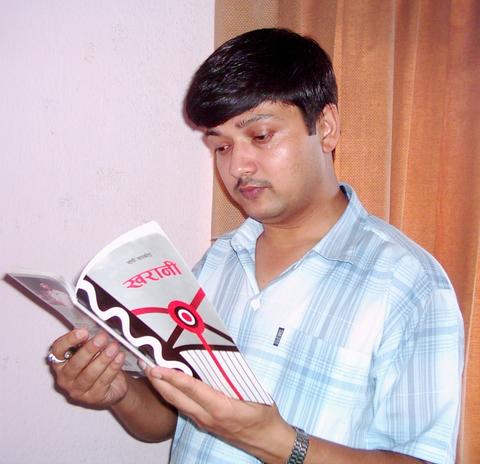By Avash KarmacharyaBorn in Dhankuta, writer and veteran theater artiste Ashesh Malla, 52, is the director of the Sarwanam theater troupe. An MA in Nepali Literature from Tribhuvan University, Ashesh wrote poems and stories from an early age. He

started his career as an officer in Family Planning Commission and worked there for three years. Later, he joined Patan Campus as a lecturer of Nepali Literature. Today, he is an Associate Professor at Padma Kanya Multiple Campus. Malla, who has acted in over one hundred street plays and dabalis, started the theater group Sarwanam in 1982. An author of over twenty-two plays and books such as Sadaksamma (drama), Anadhikram (anthology of plays), Ardhabiram (collection of stories), Ashesh, once an avid columnist, has recently brought Eklo Ekanta (anthology of poems) from Sajha Prakashan.
Tell us about the books you're currently reading…
I've just finished reading John Nobbs' Frankly Acting and have started Abhinash Shrestha's Indrakamal Ra Andhakamal.
What genre/s do you prefer to read?
If I've access, why would not I go for all? I also can't deny that we've so many choices today to pick from and read. But I enjoy reading books that are related to my profession. So I mostly pick theatrical philosophies.
Who inspired you to pick up the reading habit?
My father is an avid reader. I still remember the time when I was very young. My father always had a book in his hand; and even in his ascending eighties now, he reads like anything. During that time, having books at home in a place like Dhankuta was a great deal. We had a sort of home library. I was never forced to read. But I loved to see my father's attachment with books. Therefore, I was influenced by him and started reading. After coming to Kathmandu, I got a chance to dive into varieties of books.
One interesting reading habit that you have…I strongly believe that books are also living beings. They can feel sorrows and happiness. So I simply hate those who fold books and mishandle them. I don't even like people writing here and there on books. When I read, I make a point to underline important things by pencil and erase the lines once I'm over that thing.
Who is your favorite writer and why?
I'd say BP Koirala and Gopal Prasad Rimal. I find it stupid when people say we don't have good writers in Nepal. I must say they haven't read Nepali Literature to this day. BP's Modiain alone is sufficient to tell what a good literature is all about. Similarly, Gopal Prasad Rimal's poems are full of life and realities. The way he presents feelings in his lines are simply awesome. He has been a great source of inspiration to me.
What are the books that have touched you deeply? Can you name a few of them?
I finished reading Indian writer Mohan Rakesh's Aadhe Adhure in one hour and re-read it immediately. Now one can understand how beautiful that book is. Likewise, I read BP's Modiain twice. And no matter how many times I read this book, I always find something new and interesting to learn. I was deeply touched by Karna Shakya's Soch, Dhruba Chandra Gautam's Alikhit and Peter Brook's Empty Space too. Honestly, so many books are touching. But today, people have become so commercial that books with actual essence remain behind the curtain.
Which comes first in reading — knowledge or entertainment?
Undoubtedly, knowledge. I know that people also read for entertainment. But that seriously never happened to me. I always try to relate my reading with my profession. Perhaps, that is why I read books to attain more knowledge.
With the growth of cinema, television and so many other forms of entertainment, do you think books have been overshadowed?
I agree that the ratio of reading books has certainly come down. But there's no substitute for books. When films were introduced, people thought theaters would shut down. Did that happen? In the same manner, nothing can replace book reading. An Israeli friend told me it's not how many books people read; what matters more is one genuine person reading your book.
When you write a book, you mainly write about…
I write about people's sufferings and the nation. In a country where people don't even have access to water and salt, they dehydrate and die. What's the point in writing about how big are the mountains and how beautiful are the flowers here? That's why I make point to write about human sufferings.
How much time and money do you spend on books?
Books have always been one of my basic needs. When I go abroad, I see my friends busy in buying fancy dresses, and I, “a boring person” in their words, get myself into bookstores.
A word of advice to readers…Books are the only true source of knowledge. So you don't have an escape.
Your favorite saying on reading...
“See yourself as the audience sees you.” - John Nobbs.
(From: The Kathmandu Post:
http://www.kantipuronline.com/kolnews.php?&nid=136403)
 Gopal Parajuli is a postmodern poet in Nepali Literature. He has published hundreds of poems, plays, short stories,essays, interviews & articles in most of the leading magazines and papers from Nepal & E-magazines-Poettext (U.K.), Cubed (Canada), Paradesh (USA), Panorama (Canada), Peace Media (peacejournalism.com) (America), Freenepal (Mosco), News Blaze (US), Pressbox (London), Scoop (Newzealand) and News From Bangladesh (Bangladesh). Parajuli is currently the editor of ‘Garima’, Nepal’s foremost literary magazine.
Gopal Parajuli is a postmodern poet in Nepali Literature. He has published hundreds of poems, plays, short stories,essays, interviews & articles in most of the leading magazines and papers from Nepal & E-magazines-Poettext (U.K.), Cubed (Canada), Paradesh (USA), Panorama (Canada), Peace Media (peacejournalism.com) (America), Freenepal (Mosco), News Blaze (US), Pressbox (London), Scoop (Newzealand) and News From Bangladesh (Bangladesh). Parajuli is currently the editor of ‘Garima’, Nepal’s foremost literary magazine.


